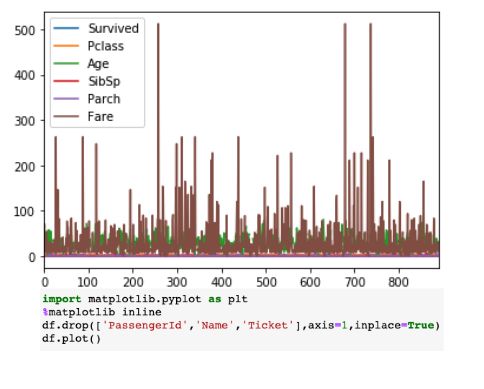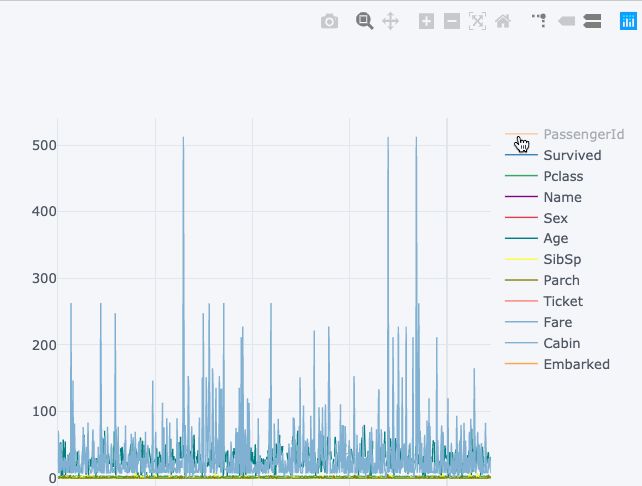- python类的定义与使用
菜鸟驿站2020
python
class01.py代码如下classTicket():#类的名称首字母大写#在类里定义的变量称为属性,第一个属性必须是selfdef__init__(self,checi,fstation,tstation,fdate,ftime,ttime,notes):self.checi=checiself.fstation=fstationself.tstation=tstationself.fdate
- Python爬虫设置代理IP
菜鸟驿站2020
python
配置代理ipfrombs4importBeautifulSoupimportrequestsimportrandom#从ip代理网站获取ip列表defget_ip_list(url,headers):web_data=requests.get(url,headers=headers)soup=BeautifulSoup(web_data.text,'lxml')ips=soup.find_all(
- Tensorflow 回归模型 FLASK + DOCKER 部署 至 Ubuntu 虚拟机
准备工作:安装虚拟机,安装ubuntu,安装python3.x、pip和对应版本的tensorflow和其他库文件,安装docker。注意事项:1.windows系统运行的模型文件不能直接运行到虚拟机上,需在虚拟机上重新运行并生成模型文件2.虚拟机网络状态改为桥接Flask代码如下:fromflaskimportFlask,request,jsonifyimportpickleimportnump
- 10个可以快速用Python进行数据分析的小技巧_python 通径分析
2401_86043917
python数据分析开发语言
df.iplot()df.iplot()vsdf.plot()右侧的可视
- 【Python多线程】
晟翰逸闻
Pythonpython
文章目录前言一、Python等待event.set二、pythonracecondition和lock使用使用锁(Lock)三.pythonDeadLock使用等综合运用总结前言这篇技术文章讨论了多线程编程中的几个重要概念。它首先介绍了等待事件的使用,并强调了避免使用“ForLoop&Sleep”进行等待的重要性。接着,文档解释了竞态条件,并提供了处理共享资源的建议,即在使用共享资源时进行加锁和解
- 【pycharm专业版】【如何远程配置Python解释器】【SSH】
资源存储库
pythonpycharm
Wejustlookedatconfiguringalocalinterpreter.Butwedon’talwayshavea“local”environment.Sometimes–andincreasinglyoften–ourenvironmentisoverthere.我们刚刚看了配置本地解释器。但我们并不总是有一个“本地”的环境。有时候–而且越来越多的时候–我们的环境就在那里。Let’
- python线程同步锁_python的Lock锁,线程同步
weixin_39649660
python线程同步锁
一、Lock锁凡是存在共享资源争抢的地方都可以使用锁,从而保证只有一个使用者可以完全使用这个资源一旦线程获得锁,其他试图获取锁的线程将被阻塞acquire(blocking=True,timeout=-1):默认阻塞,阻塞可以设置超时时间,非阻塞时,timeout禁止设置,成功获取锁,返回True,否则返回Falsereleas():释放锁,可以从任何线程调用释放,已上锁的锁,会被重置为unloc
- 并发与并行:python多线程详解
m_merlon
python服务器Python进阶教程python
简介多进程和多线程都可以执行多个任务,线程是进程的一部分。线程的特点是线程之间可以共享内存和变量,资源消耗少,缺点是线程之间的同步和加锁比较麻烦。在cpython中,截止到3.12为止依然存在全局解释器锁(GIL),不能发挥多核的优势,因此python多线程更适合IO密集型任务并发提高效率,CPU密集型任务推荐使用多进程并行解决。注:此说法仅适用于python(如:c++的多线程可以利用到多核并行
- python多线程:生产者与消费者,高级锁定Condition、queue队列使用案例与注意事项
网小鱼的学习笔记
Pythonpythonjava大数据
高级锁定这是python中的另一种中锁定,就像是它的名字一样是可以有条件的condition,首先程序使用acquire进入锁定状态,如果需要符合一定的条件才处理数据,此时可以调用wait,让自己进入睡眠状态,程序设计时候需要用notify通知其他线程,然后放弃锁定release此时其他再等待的线程因为受到通知notify,这时候被激活了,就开始运作。生产者与消费者的设计程序用producer方法
- python协程与异步并发,同步与阻塞,异步与非阻塞,Python异步IO、协程与同步原语介绍,协程的优势和劣势
网小鱼的学习笔记
Pythonpython服务器开发语言
协程与异步软件系统的并发使用异步IO,无非是我们提的软件系统的并发,这个软件系统,可以是网络爬虫,也可以是web服务等并发的方式有多种,多线程,多进程,异步IO等多线程和多进程更多应用于CPU密集型的场景,比如科学计算的事件都消耗在CPU上面,利用多核CPU来分担计算任务多线程和多进程之间的场景切换和通讯代价很高,不适合IO密集型的场景,而异步IO就是非常适合IO密集型的场景,例如网络爬虫和web
- 使用Python和FFmpeg实现RGB到YUV444的转换
追逐程序梦想者
ffmpegpython开发语言
使用Python和FFmpeg实现RGB到YUV444的转换如果你需要将RGB图像转换为YUV444格式的图像,那么本文将为你提供一个简单且可靠的方法。我们将使用Python和FFmpeg来完成这个任务。首先,让我们了解一下什么是RGB和YUV。RGB表示红、绿、蓝三种颜色的组合,是最常见的图像格式之一。另一方面,YUV是一种亮度-色度编码,用于视频压缩和传输,它将图像分成明亮度(Y)和色度(U和
- 如何利用ssh使得pycharm连接服务器的docker容器内部环境
SoulMatter
docker容器运维pycharmssh
如题,想要配置服务器的python编译器环境,来查看容器内部环境安装的包的情况。首先,需要确定容器的状态,使用dockerps查看,只有ports那一栏有内容才证明容器暴露了端口出来。如果没有暴露,就需要将容器打包成镜像,然后将镜像再启动一个容器才可以。步骤如下:如何打包镜像:(里面包括了将镜像从A服务器远程传输到B服务器后使用的方法,如果是在本服务器自己使用,那么忽略远程传输的步骤)#创建一个基
- python多线程高级锁知识:Semaphore信号量、Barrier栅栏在线程中的使用、高级event事件
网小鱼的学习笔记
Pythonpython开发语言
Semaphore信号量Semaphore信号量可以翻译为信号量,这个信号量代表了最多允许线程访问的数量,可以使用Semaphore(n)设定,n是信号数量,这是一个更高级的锁机制,Semaphore管理一个计数器,每次使用acquire计数器将会减一,表示可以允许线程访问的数量少了一个,使用release计数器加1,表示可允许线程访问的数量多了一个,只有占用信号量的线程数量超过信号量时候才会阻塞
- python:assert和raise区别
Covirtue
python
assert和raise是在错误处理方面的两个不同的用法。assert是一种断言语句,用于在代码中检查一个条件是否为True。如果条件为False,它会引发一个AssertionError异常。assert主要用于调试目的,以确保代码的正确性。当代码被优化时,assert语句可能会被自动忽略。例如:```pythonx=5assertx>0,"x必须大于0"```如果x不大于0,将引发Assert
- Python读取红外图像 - 实现红外图像的读取和处理
程序员杨弋
Python全栈工程师学习指南python计算机视觉opencv
在许多工业、安防等领域中,红外图像无疑是一种不可或缺的重要资源,因此,能够快速、准确地读取和处理红外图像,对于工程师和科学家来说非常必要。Python作为一种强大的编程语言,提供了丰富的图像处理库,允许我们轻松地读取和处理红外图像,本文将介绍如何使用Python读取红外图像,并对其进行简单的处理。首先需要准备一个目标红外图像文件,这里我们以bmp格式的文件为例:importcv2img=cv2.i
- python raise和assert的区别
40kuai
python中raise和assert的区别一、使用raise抛出异常python可以自动触发异常,raise(内置函数)的定义为显示的抛出异常,用户可以使用raise进行判断,显式的引发异常,raise执行后程序将不再向下执行。式例:#!/usr/bin/envpython#-*-coding:utf-8-*-__author__='40kuai'books_dict={'name':'pyth
- python解析风云4B生成真彩云图
小天丶1
气象数据处理python开发语言
文章目录概要话不多数开整小结概要真彩色云图需要根据通道Channel01,通道Channel02,通道Channel03进行通道融合处理,大致思路:三个通道对于RGB三个颜色管道,然后合并成一个三通道图像,其余云图在历史文档里有python解析风云4B,生成红外云图、可见光云图、水汽云图https://blog.csdn.net/qq_38197010/article/details/146549
- java运行python脚本同时实现传参响应接收
小天丶1
javapythonjava开发语言
提示:文章写完后,目录可以自动生成,如何生成可参考右边的帮助文档文章目录前言一、java部分示例二、python代码示例前言提示:这里可以添加本文要记录的大概内容:主要帮助从事java开发却涉及一些计算操作的时候发现没有python库更高效的解决方式提示:以下是本篇文章正文内容,下面案例可供参考一、java部分示例//调用Python脚本//pythonl路径pythonl路径Stringpyth
- 2025华为od机试真题B卷【停车场费用统计】Python实现
MISAYAONE
OD机试华为odpython开发语言华为od机试2025B卷
目录题目思路Code题目停车场统计当日总收费,包月的车不统计,不包月的车半个小时收一块钱,不满半小时不收钱,如果超过半小时,零头不满半小时按半小时算,每天11:30-13:30时间段不收钱,如果一辆车停车时间超过8小时后不收费。现提供停车场进出车辆的统计信息,需要你来计算停车场统计当日的总收费。输入描述第一行输入一个整数n表示今日进出停车场的包月的车辆数下一个行输入包月车的车牌号,以空格分割接下来
- 成为高级Python开发人员的完整学习路线与核心知识体系
引言Python已成为全球最受欢迎的编程语言之一,其简洁的语法和强大的生态系统使其在数据科学、Web开发、自动化、人工智能等领域占据重要地位。然而,从初级Python程序员到真正的高级开发人员,需要掌握一系列深入的知识点和实践经验。本文将详细介绍成为高级Python开发人员必备的核心知识体系,并提供系统化的学习资源,帮助你规划专业发展路径。第一部分:Python语言基础进阶1.Python语言特性
- 2025.06.11华为暑期实习机试真题【物流运输】Java/Python/C++/JS/C 实现
MISAYAONE
python华为java华为暑期实习机试c++
目录题目思路Code题目物流公司每天都要处理很多物流的运输工作,整个城市共有N个地点。共有N-1条公路,每2个地点之间都能通过公路连通。物流公司总部位于1号地点。今天有一辆物流运偷车共有M条物流运输任务,物流运输车每天的工作流程如下:先要从总部出发去收取所有的寄件货物,收到所有货物后回到总部扫描货物,再从总部出发将货物送至所有的送件地址,送完后最终回到总部,算作完成了今天的运输工作,请问该辆物流运
- Y-Combinator推导的Golang描述
武昌库里写JAVA
面试题汇总与解析springbootvue.js宠物管理课程设计java
缘起在做计算的本质指称语义的时候,遇到了需要在Python匿名递归调用。Python的lambda表达式本身不支持,需要借助Y-Combinator技术实现。于是研究了下Y-Combinator。中文世界了很多Blog介绍和推导Y-Combinator的文章。然而大部分的文章都省略了推导的关键步骤和推导的依据。仿佛读者都默认已经懂得Y-Combinator了。最后我在Youtube上找到了Ruby
- 树莓派实验——人脸识别
Rounie
opencvpython计算机视觉
importnumpyasnp#导入numpy科学计算库importcv2#导入OpenCV函数库#装载人脸识别特征文件face_cascade=cv2.CascadeClassifier('/usr/local/lib/python3.5/dist-packages/cv2/data/haarcascade_frontalface_alt.xml')cap=cv2.VideoCapture(0)
- 2024年Python最全人脸检测实战高级:使用 OpenCV、Python 和 dlib 完成眨眼检测
2401_84691757
程序员pythonopencv开发语言
然而,一旦人眨眼(右上),眼睛的纵横比就会急剧下降,接近于零。下图绘制了视频剪辑的眼睛纵横比随时间变化的图表。正如我们所看到的,眼睛纵横比是恒定的,然后迅速下降到接近零,然后再次增加,表明发生了一次眨眼。在下一节中,我们将学习如何使用面部标志、OpenCV、Python和dlib实现眨眼检测的眼睛纵横比。使用面部标志和OpenCV检测眨眼==============================
- Python的内存管理
星辰灬
Pythonpythonpycharm
Python的内存管理在Python中,内存管理涉及到一个包含所有Python对象和数据结构的私有堆(heap)。这个私有堆的管理由内部的Python内存管理器(Pythonmemorymanager)保证。Python内存管理器有不同的组件来处理各种动态存储管理方面的问题,如共享、分割、预分配或缓存。内存管理机制动态内存分配:Python使用动态内存分配,这意味着它在运行时动态分配和管理内存,而
- 【Tkinter从入门到精通】Python原生GUI开发全指南
满怀1015
python开发语言TkinterGUI开发桌面应用界面设计
目录前言️技术背景与价值当前技术痛点️解决方案概述目标读者说明一、技术原理剖析核心概念图解核心作用讲解关键技术模块说明⚖️技术选型对比️二、实战演示⚙️环境配置要求核心代码实现案例1:基础窗口创建案例2:网格布局计算器案例3:文件选择对话框✅运行结果验证⚡三、性能对比测试方法论量化数据对比结果分析四、最佳实践✅推荐方案❌常见错误调试技巧五、应用场景扩展适用领域创新应用方向生态工具链✨结语⚠️技术局
- 【模型部署】如何在Linux中通过脚本文件部署模型
满怀1015
人工智能linux网络人工只能模型部署
在Linux中,你可以将部署命令保存为可执行脚本文件,并通过终端直接调用。以下是几种常见且实用的方法:方法1:Shell脚本(推荐)步骤创建一个.sh文件(例如start_vllm.sh):#!/bin/bashCUDA_VISIBLE_DEVICES=7\python-mvllm.entrypoints.openai.api_server\--served-model-nameQwen2-7B-
- 如果用于AI评课系统的话——五款智能体比较
东方-教育技术博主
人工智能应用人工智能
你目前的项目特点是:已经具备了课堂文本分析、大模型对话系统、课堂视频分析的技术模块;计划通过智能体调用你现有的Python分析脚本,实现数据分析、自动可视化,并与教师互动;更强调多智能体协作、流程灵活编排,以及循证研究的交互分析。因此,我们重点考量生态成熟度、流程编排能力、多智能体协作能力、易用性四个维度。下面逐个分析你提到的框架:智能体框架综合对比分析:框架生态成熟度多智能体能力流程编排能力易用
- 如何用Python实现基础的文生视频AI模型
AI学长带你学AI
AI人工智能与大数据应用开发AI应用开发高级指南python音视频人工智能ai
如何用Python实现基础的文生视频AI模型关键词:文生视频、AI生成、扩散模型、多模态对齐、视频生成算法、Python实现、时间一致性摘要:本文系统讲解基于扩散模型的文生视频(Text-to-Video,T2V)AI模型的核心原理与Python实现方法。从技术背景到数学模型,从算法设计到项目实战,逐步拆解文本-视频跨模态对齐、时间序列建模、扩散生成等关键技术。通过PyTorch实现一个基础版文生
- 【Python GUI框架全解析】六大主流工具对比与实战指南
满怀1015
python开发语言GUI开发PyQtwxPythonKivy
目录前言️技术背景与价值当前技术痛点️解决方案概述目标读者说明一、技术原理剖析核心框架对比图框架定位分析关键技术指标️二、实战演示⚙️环境配置核心代码实现案例1:PyQt5现代化窗口案例2:wxPython文件管理器案例3:Kivy移动风格界面案例4:DearPyGui实时仪表盘✅运行结果验证⚡三、性能对比测试方法论量化数据对比结果分析四、最佳实践✅框架选型建议❌常见误区️调试技巧五、应用场景扩展
- 多线程编程之理财
周凡杨
java多线程生产者消费者理财
现实生活中,我们一边工作,一边消费,正常情况下会把多余的钱存起来,比如存到余额宝,还可以多挣点钱,现在就有这个情况:我每月可以发工资20000万元 (暂定每月的1号),每月消费5000(租房+生活费)元(暂定每月的1号),其中租金是大头占90%,交房租的方式可以选择(一月一交,两月一交、三月一交),理财:1万元存余额宝一天可以赚1元钱,
- [Zookeeper学习笔记之三]Zookeeper会话超时机制
bit1129
zookeeper
首先,会话超时是由Zookeeper服务端通知客户端会话已经超时,客户端不能自行决定会话已经超时,不过客户端可以通过调用Zookeeper.close()主动的发起会话结束请求,如下的代码输出内容
Created /zoo-739160015
CONNECTEDCONNECTED
.............CONNECTEDCONNECTED
CONNECTEDCLOSEDCLOSED
- SecureCRT快捷键
daizj
secureCRT快捷键
ctrl + a : 移动光标到行首ctrl + e :移动光标到行尾crtl + b: 光标前移1个字符crtl + f: 光标后移1个字符crtl + h : 删除光标之前的一个字符ctrl + d :删除光标之后的一个字符crtl + k :删除光标到行尾所有字符crtl + u : 删除光标至行首所有字符crtl + w: 删除光标至行首
- Java 子类与父类这间的转换
周凡杨
java 父类与子类的转换
最近同事调的一个服务报错,查看后是日期之间转换出的问题。代码里是把 java.sql.Date 类型的对象 强制转换为 java.sql.Timestamp 类型的对象。报java.lang.ClassCastException。
代码:
- 可视化swing界面编辑
朱辉辉33
eclipseswing
今天发现了一个WindowBuilder插件,功能好强大,啊哈哈,从此告别手动编辑swing界面代码,直接像VB那样编辑界面,代码会自动生成。
首先在Eclipse中点击help,选择Install New Software,然后在Work with中输入WindowBui
- web报表工具FineReport常用函数的用法总结(文本函数)
老A不折腾
finereportweb报表工具报表软件java报表
文本函数
CHAR
CHAR(number):根据指定数字返回对应的字符。CHAR函数可将计算机其他类型的数字代码转换为字符。
Number:用于指定字符的数字,介于1Number:用于指定字符的数字,介于165535之间(包括1和65535)。
示例:
CHAR(88)等于“X”。
CHAR(45)等于“-”。
CODE
CODE(text):计算文本串中第一个字
- mysql安装出错
林鹤霄
mysql安装
[root@localhost ~]# rpm -ivh MySQL-server-5.5.24-1.linux2.6.x86_64.rpm Preparing... #####################
- linux下编译libuv
aigo
libuv
下载最新版本的libuv源码,解压后执行:
./autogen.sh
这时会提醒找不到automake命令,通过一下命令执行安装(redhat系用yum,Debian系用apt-get):
# yum -y install automake
# yum -y install libtool
如果提示错误:make: *** No targe
- 中国行政区数据及三级联动菜单
alxw4616
近期做项目需要三级联动菜单,上网查了半天竟然没有发现一个能直接用的!
呵呵,都要自己填数据....我了个去这东西麻烦就麻烦的数据上.
哎,自己没办法动手写吧.
现将这些数据共享出了,以方便大家.嗯,代码也可以直接使用
文件说明
lib\area.sql -- 县及县以上行政区划分代码(截止2013年8月31日)来源:国家统计局 发布时间:2014-01-17 15:0
- 哈夫曼加密文件
百合不是茶
哈夫曼压缩哈夫曼加密二叉树
在上一篇介绍过哈夫曼编码的基础知识,下面就直接介绍使用哈夫曼编码怎么来做文件加密或者压缩与解压的软件,对于新手来是有点难度的,主要还是要理清楚步骤;
加密步骤:
1,统计文件中字节出现的次数,作为权值
2,创建节点和哈夫曼树
3,得到每个子节点01串
4,使用哈夫曼编码表示每个字节
- JDK1.5 Cyclicbarrier实例
bijian1013
javathreadjava多线程Cyclicbarrier
CyclicBarrier类
一个同步辅助类,它允许一组线程互相等待,直到到达某个公共屏障点 (common barrier point)。在涉及一组固定大小的线程的程序中,这些线程必须不时地互相等待,此时 CyclicBarrier 很有用。因为该 barrier 在释放等待线程后可以重用,所以称它为循环的 barrier。
CyclicBarrier支持一个可选的 Runnable 命令,
- 九项重要的职业规划
bijian1013
工作学习
一. 学习的步伐不停止 古人说,活到老,学到老。终身学习应该是您的座右铭。 世界在不断变化,每个人都在寻找各自的事业途径。 您只有保证了足够的技能储
- 【Java范型四】范型方法
bit1129
java
范型参数不仅仅可以用于类型的声明上,例如
package com.tom.lang.generics;
import java.util.List;
public class Generics<T> {
private T value;
public Generics(T value) {
this.value =
- 【Hadoop十三】HDFS Java API基本操作
bit1129
hadoop
package com.examples.hadoop;
import org.apache.hadoop.conf.Configuration;
import org.apache.hadoop.fs.FSDataInputStream;
import org.apache.hadoop.fs.FileStatus;
import org.apache.hadoo
- ua实现split字符串分隔
ronin47
lua split
LUA并不象其它许多"大而全"的语言那样,包括很多功能,比如网络通讯、图形界面等。但是LUA可以很容易地被扩展:由宿主语言(通常是C或 C++)提供这些功能,LUA可以使用它们,就像是本来就内置的功能一样。LUA只包括一个精简的核心和最基本的库。这使得LUA体积小、启动速度快,从 而适合嵌入在别的程序里。因此在lua中并没有其他语言那样多的系统函数。习惯了其他语言的字符串分割函
- java-从先序遍历和中序遍历重建二叉树
bylijinnan
java
public class BuildTreePreOrderInOrder {
/**
* Build Binary Tree from PreOrder and InOrder
* _______7______
/ \
__10__ ___2
/ \ /
4
- openfire开发指南《连接和登陆》
开窍的石头
openfire开发指南smack
第一步
官网下载smack.jar包
下载地址:http://www.igniterealtime.org/downloads/index.jsp#smack
第二步
把smack里边的jar导入你新建的java项目中
开始编写smack连接openfire代码
p
- [移动通讯]手机后盖应该按需要能够随时开启
comsci
移动
看到新的手机,很多由金属材质做的外壳,内存和闪存容量越来越大,CPU速度越来越快,对于这些改进,我们非常高兴,也非常欢迎
但是,对于手机的新设计,有几点我们也要注意
第一:手机的后盖应该能够被用户自行取下来,手机的电池的可更换性应该是必须保留的设计,
- 20款国外知名的php开源cms系统
cuiyadll
cms
内容管理系统,简称CMS,是一种简易的发布和管理新闻的程序。用户可以在后端管理系统中发布,编辑和删除文章,即使您不需要懂得HTML和其他脚本语言,这就是CMS的优点。
在这里我决定介绍20款目前国外市面上最流行的开源的PHP内容管理系统,以便没有PHP知识的读者也可以通过国外内容管理系统建立自己的网站。
1. Wordpress
WordPress的是一个功能强大且易于使用的内容管
- Java生成全局唯一标识符
darrenzhu
javauuiduniqueidentifierid
How to generate a globally unique identifier in Java
http://stackoverflow.com/questions/21536572/generate-unique-id-in-java-to-label-groups-of-related-entries-in-a-log
http://stackoverflow
- php安装模块检测是否已安装过, 使用的SQL语句
dcj3sjt126com
sql
SHOW [FULL] TABLES [FROM db_name] [LIKE 'pattern']
SHOW TABLES列举了给定数据库中的非TEMPORARY表。您也可以使用mysqlshow db_name命令得到此清单。
本命令也列举数据库中的其它视图。支持FULL修改符,这样SHOW FULL TABLES就可以显示第二个输出列。对于一个表,第二列的值为BASE T
- 5天学会一种 web 开发框架
dcj3sjt126com
Web框架framework
web framework层出不穷,特别是ruby/python,各有10+个,php/java也是一大堆 根据我自己的经验写了一个to do list,按照这个清单,一条一条的学习,事半功倍,很快就能掌握 一共25条,即便很磨蹭,2小时也能搞定一条,25*2=50。只需要50小时就能掌握任意一种web框架
各类web框架大同小异:现代web开发框架的6大元素,把握主线,就不会迷路
建议把本文
- Gson使用三(Map集合的处理,一对多处理)
eksliang
jsongsonGson mapGson 集合处理
转载请出自出处:http://eksliang.iteye.com/blog/2175532 一、概述
Map保存的是键值对的形式,Json的格式也是键值对的,所以正常情况下,map跟json之间的转换应当是理所当然的事情。 二、Map参考实例
package com.ickes.json;
import java.lang.refl
- cordova实现“再点击一次退出”效果
gundumw100
android
基本的写法如下:
document.addEventListener("deviceready", onDeviceReady, false);
function onDeviceReady() {
//navigator.splashscreen.hide();
document.addEventListener("b
- openldap configuration leaning note
iwindyforest
configuration
hostname // to display the computer name
hostname <changed name> // to change
go to: /etc/sysconfig/network, add/modify HOSTNAME=NEWNAME to change permenately
dont forget to change /etc/hosts
- Nullability and Objective-C
啸笑天
Objective-C
https://developer.apple.com/swift/blog/?id=25
http://www.cocoachina.com/ios/20150601/11989.html
http://blog.csdn.net/zhangao0086/article/details/44409913
http://blog.sunnyxx
- jsp中实现参数隐藏的两种方法
macroli
JavaScriptjsp
在一个JSP页面有一个链接,//确定是一个链接?点击弹出一个页面,需要传给这个页面一些参数。//正常的方法是设置弹出页面的src="***.do?p1=aaa&p2=bbb&p3=ccc"//确定目标URL是Action来处理?但是这样会在页面上看到传过来的参数,可能会不安全。要求实现src="***.do",参数通过其他方法传!//////
- Bootstrap A标签关闭modal并打开新的链接解决方案
qiaolevip
每天进步一点点学习永无止境bootstrap纵观千象
Bootstrap里面的js modal控件使用起来很方便,关闭也很简单。只需添加标签 data-dismiss="modal" 即可。
可是偏偏有时候需要a标签既要关闭modal,有要打开新的链接,尝试多种方法未果。只好使用原始js来控制。
<a href="#/group-buy" class="btn bt
- 二维数组在Java和C中的区别
流淚的芥末
javac二维数组数组
Java代码:
public class test03 {
public static void main(String[] args) {
int[][] a = {{1},{2,3},{4,5,6}};
System.out.println(a[0][1]);
}
}
运行结果:
Exception in thread "mai
- systemctl命令用法
wmlJava
linuxsystemctl
对比表,以 apache / httpd 为例 任务 旧指令 新指令 使某服务自动启动 chkconfig --level 3 httpd on systemctl enable httpd.service 使某服务不自动启动 chkconfig --level 3 httpd off systemctl disable httpd.service 检查服务状态 service h